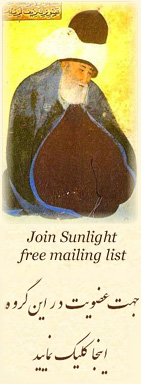Here, Sunlight offers Ghazal 2530 from the Diwan-e Shams,
in a version by Coleman Barks, in translation by Annemarie
Schimmel, and in translation by A.J. Arberry:
~~~~~~~~~~~~~~~~~~~~~~~~~~~~~~~~~~~~~~~~~
I become a pen in the Friend's hand,
tonight writing "say," tomorrow "ray."
He trims the pen for fine calligraphy.
The pen says, "I am here, but who am I?"
He blackens the pen's face.
He wipes it in his hair. He holds it upside down.
Now he begins to use it.
On one sheet he cancels everything.
On another he adds a dangerous conjunction.
The writing depends entirely on the scribe,
who knows how to split the head of the pen.
Galen knows what a patient needs.
The pen cannot speak for itself, or know what
to disapprove of in its own nature.
Whether I say "pen" or "flag", it is with this wonderful
conscious unconsciousness: the mind unable to include
its own description, composing blindly.
Held in a hand, yet free.
-- Version by Coleman Barks
(Based on the translation by A.J. Arberry)
"These Branching Moments"
Copper Beech Press, 1988
~~~~~~~~~~~~~~~~~~~~~~~~~
My heart became like a pen
that's in the Beloved's fingers:
Tonight he may write a Z,
perhaps tomorrow, a B.
He cuts and prepares his pen well
to write in riqa and naskh;*
The pen says: "Lo, I obey,
for you know best what to do."
Sometimes he blackens its face,
he wipes it then in his hair,
He holds it now upside down,
sometimes he writes with it too. . .
-- Translation by Annemarie Schimmel
"I Am Wind, You are Fire"
Shambhala, 1992
*riqa and naskh: two styles of writing Persian.
~~~~~~~~~~~~~~~~~~~~~~~~~
My heart came like a pen in the fingers of the Beloved; tonight
it is writing "zay," tomorrow it will write "ray."*
He trims a pen for epistolary style, copying and the rest; the
pen says, "I am resigned, you know; who am I, lord?"
Now he blackens its face, now he rubs it in his hair; now he
holds it upside down, now he uses it for a task.
On one sheet he cancels a world and makes it headless; on
another sheet he delivers a [perilous] conjunction from calamity.
The splendor of the pen is according to the dignity of the
scribe, whether it is in the hand of a king or a commander.
He splits its head for the reason he knows; Galen* knows best
what is best for the patient.
That pen is unable to utter by its own reason any applause;
that pen knows not of its own nature to make disapproval.
Whether I call it pen or all it flag, in it is sense and senselessness --
bravo, the conscious senseless one!
The mind can not compass its description, for in it is the union
of opposites, a composition without composition, amazing! --
constrained yet with free will.
-- Translation by A. J. Arberry
"Mystical Poems of Rumi 2"
The University of Chicago Press, 1991
Sunlight footnotes:
*zay and ray: the letters "z" and "r," respectively.
*Galen: the famous second century Greek physician.
-- Footnotes (c) Ibrahim Gamard, 2000
~~~~~~~~~~~~~~~~~~~~~~~~~~~~~~~~~~~~~~~~~
~
------------------------------------
Archive for Sunlight can be accessed at:
http://groups.yahoo.com/group/Sunlight /messages
To subscribe, please send an email to : sunlight-subscribe@yahoogroups.com
To unsubscribe, please send an email to: sunlight-unsubscribe@yahoogroups.com
Yahoo! Groups Links
<*> To visit your group on the web, go to:
http://groups.yahoo.com/group/Sunlight/
<*> Your email settings:
Individual Email | Traditional
<*> To change settings online go to:
http://groups.yahoo.com/group/Sunlight/join
(Yahoo! ID required)
<*> To change settings via email:
Sunlight-digest@yahoogroups.com
Sunlight-fullfeatured@yahoogroups.com
<*> To unsubscribe from this group, send an email to:
Sunlight-unsubscribe@yahoogroups.com
<*> Your use of Yahoo! Groups is subject to:
http://docs.yahoo.com/info/terms/
![]()







No comments:
Post a Comment